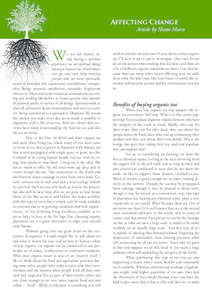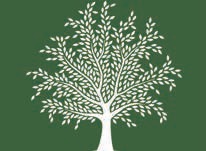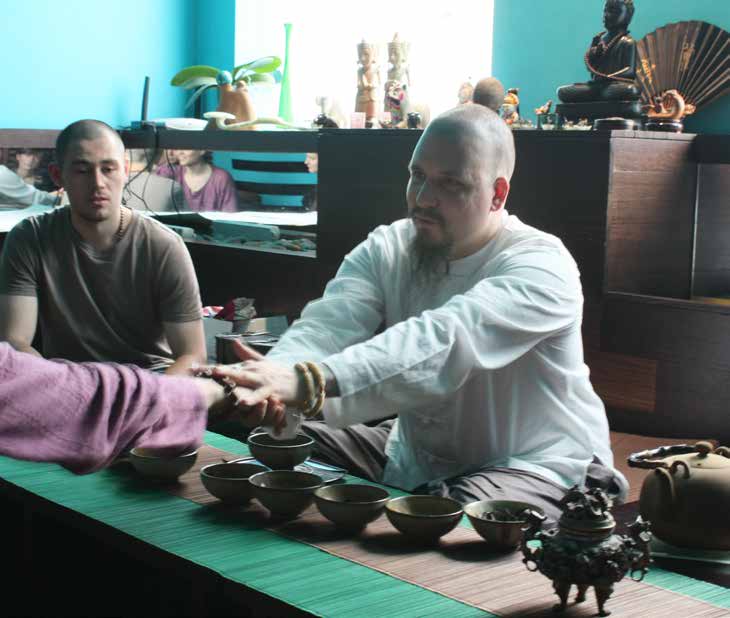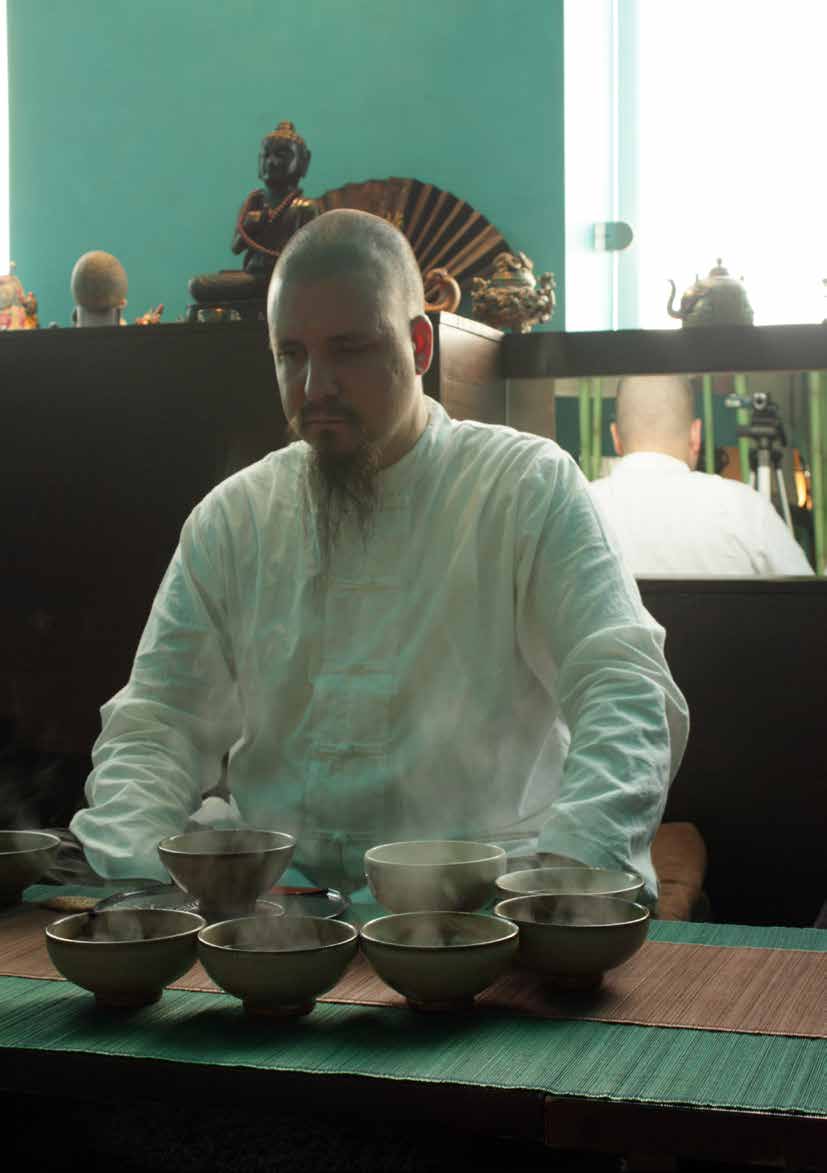
 |
|
We are not human beings having a spiritual experience; we are spiritual beings having a human one. Everywhere you go you can't help meeting people who are more spiritually aware of concepts like equanimity, mindfulness, compassion, Being, presence, meditation, surrender, forgiveness and so on. More and more conscious communities are arising and lending themselves to causes greater than pursuit of personal profit, in service of all beings. Spiritual work is, after all, ultimately about transcendence and service to others. Being committed to a spiritual or Dhammic life means the choices you make every day are as much as possible in alignment with a life of service. And one choice that everyone faces today is surrounding the food we eat, and also the tea we drink.

Here at the Hut, we drink and share organic tea and more often living tea, which many of you have come to know as tea that is grown in harmony with Nature; tea that is seed-propagated with ample space to grow; tea that is tended to by caring human hands; real tea, with an energy that speaks to your heart. Living tea is the ideal. She has so much to offer. An old tree's roots tap deep and its crown sweeps the sky. That connection to the Earth and the Heavens relays a message in every brew, every bowl. Genetic variance sits in each seed and a local ecology unfurls in each leaf. Such tea not only heals us now in the present, but also will be here long after we are gone to heal future lovers of tea. But as we've said before, the major problem with this type of tea is that it simply can't be made available to everyone due to its growing conditions and time requirements. In lieu of having living tea always available, as we are so lucky to have at the Tea Sage Hut, choosing organic plantation tea is a great alternative to align your tea-self with Nature.
Without going into any great detail on the economics of organics, I would simply like to talk about tea and what it means for you, and us here in Taiwan, when we buy organic. Let organic not be constricted to any particular set of values, certifications or trademark standards. What does organic mean to you on an intuitive level? I like to think about the food and agriculture practices during times when people were really in tune with their environment and the cosmos; when people lived off their own land and respected Her as part of their family; when soil was clean enough to eat raw; when organic food was just called... "food". While certification is something you will Article by Shane Marrs need to consider on your own if you choose to buy organic tea. I'll leave it up to you to investigate. One can't be too lax or too serious when making that decision, and there are a lot of different organic standards out there. I say that because there are many other factors affecting your tea aside from what the label says, like your frame of mind, the intention behind your actions and the environment you live in.
When you buy organic tea you support the organic tea movement. Full stop. What is it that you're supporting? Your purchase supports organic farmers who have the integrity of the earth in mind. Ideally, they care for their crops, they care for their land, they care about the people down the food chain who end up consuming their product and they care about their own health. This is the energy that goes into raising their tea, and your purchase says you support that!
For us, in considering tea farming, we draw the line at chemical inputs. So long as the tea is surviving from the organic life in the soil itself, and so long as weed and pest control are conducted in ways that do not harm the earth, we like to support those farmers, certified or not. Word of mouth is good enough for us when relating directly to the farmers. Though the tea may be propagated from cuttings, though it may be planted in dense rows, though it may be treated as a commercial crop, this type of plantation tea, lacking any chemical input, plays a very crucial role in our world. Why? Because there are a lot of tea lovers out there! It is well known that tea is the second most consumed substance in the world, next to water of course, and that means if people are to receive the message tea has to offer on such a large scale, it needs to be made available on an equally large scale. And this type of tea is capable of meeting that demand without forgetting the importance of sustainable, clean farming practices while still accounting for all the tea lovers. That's why it's great to buy and support tea of this kind: It can reach a large audience while still upholding the integrity of the Earth.

When purchasing this type of tea you are also supporting a future where clean, healthy and sustainable tea is available. Whereas conventional methods of agriculture might yield higher quantities of tea now, they lack the dimension of time simply because when you force the land to give more than it has to offer and then try to make up for that depletion with large chemical inputs, you have an unsustainable system on your hands. Mother Earth can only sustain so much abuse before having nothing left to offer in terms of fertility. Organic plantation tea is available in both time and space, meaning it's available now and into the future and in a quantity sufficient to heal us all without compromising the health of our planet. The only reason to compromise from Living Tea to plantation tea is to make more available to tea lovers, since there are so many of us. And inorganic tea doesn't do that, since it doesn't take future tea lovers into account!
Here, you are supporting earth-conscious farmers, sustainable, clean agriculture practices, the earth itself and even future tea drinkers! But what about yourself? Buying organic tea suggests that you not only care about others but that you also care about yourself and your own health, which in turn can be shared back again to others!
Indirectly, we are also supporting smaller-scale farmers and cooperatives because, while organics probably can be maintained on quite large scales, the whole philosophy of going organic and being a steward of the land lends itself to small-scale agriculture practices; Just as the spirit of gong fu tea is better suited to smaller groups of tea lovers. Inorganic tea is one of the most destructive crops in the world, being farmed on unimaginably large scales on mountaintops. Deforestation, heavy chemical inputs, monoculture and greedy harvests result in chemical runoff and water contamination, landslides, ecological imbalance, loss of soil fertility, short term farming, and tea so far removed from its natural state of being we might even call it something else altogether. In Taiwan, there are still lots of small-scale tea farmers and cooperatives that support each other through trying times and they also need the support of people like us so that they can continue offering their services.
In being a GTH member, you are not only inviting the benefits of buying organic into your life but also supporting the whole organic tea movement. As a consumer, buying organic and signing up for GTH, you are in one sense casting a vote, which lets farmers/merchants/middlemen/etc. know where your values lie and how much you're willing to spend. You really are voting every time you make a purchase. It makes a statement, and farmers are listening. I'm no expert on economics or any aspect of business, heck I'm not even an amateur, but I can tell you from a farmers point of view that there is great truth in saying that consumers hold the power when it comes to price and product, especially in a place like Taiwan where so much small-scale farming is still prevalent and farmer-buyer relationships are direct. I can only imagine the complexity of the system that our purchasing votes have to traverse through in order to reach the farmer. The message of our votes may be manipulated or even withheld altogether with big companies and big money between us and the farmers, but in one way or another, the farmers are getting the message, especially as consumer awareness increases. All the more reason being a GTH member is helping to effect positive change. Your donation is the manifestation of a clear, unobstructed message to farmers and retailers that living and organic tea is important to you and worth the extra cost. While it may be more expensive now, as more people cast their vote, causing the demand for organic tea to rise, the supply will increase to meet that demand and eventually the prices will level out.

So bear in mind that as a member of GTH, as a consumer of organic and/or Living Tea, you have power and you are effecting change. You are influencing systems beyond what you might expect by simply enjoying a bowl of tea and sharing it with others. Hold that bowl close to your heart in between sips and reflect on what that means. It means you are awesome and we love what you're doing!
Possibly you simply aren't in the position to buy your tea organic, be it the extra cost or limited access. We can't blame you; it often is more expensive and less widely available (all the more reason for those who can afford it and have access to it to buy it, because eventually it will be worth making available on a larger scale, ideally without sacrificing quality, and thus become more feasible for more people). In the case that you find yourself with some inorganic tea, possibly gifted to you for example, there are a few things to consider as I alluded to in the beginning. Tea leaves are very sensitive, as is water, making brewed tea doubly sensitive. Therefore, the frame of mind in which you approach your tea makes all the difference in the world. As high quality teaware can increase a poorer quality tea, so too a clear mind can clear the impurities of tea, for what are the impurities in tea if not the impurities in our mind? I like to say that the poorest quality tea served with the greatest of intentions is always going to be better than the highest quality tea served with the worst of intentions. Another method of transforming your tea is to celebrate it with loved ones. Drink your tea with love and with loved ones. This type of space is so strong, and very important to the quality of our lives - so important that it can trump the many negative associations we might otherwise impart on the things we consume. If I haven't convinced you, or you can't host such a belief system yourself, just compost such teas or use them as mulch. Then, time will take care of the problem, and twenty grams of inorganic tea will one day be recycled into twenty grams of something else. In the end, the tea is spirit anyway...
"When it is understood that one loses joy and happiness in the attempt to possess them, the essence of natural farming will be realized. The ultimate goal of farming is not the growing of crops, but the cultivation and perfection of human beings."- Masanobu Fukuoka, The One-Straw Revolution
